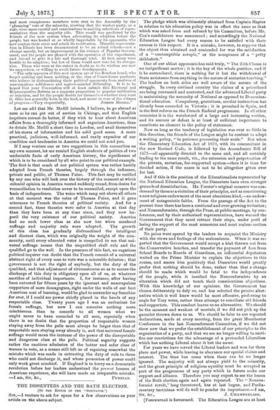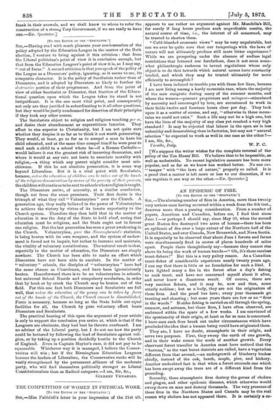THE DISSENTERS AND THE BATH ELECTION.
[TO THE EDITOR OF THE "SPECTAT0R:1
SIE,—I venture to ask for space for a few observations on your article on the above subject.
I The pledge which was ultimately obtained from Captain Hayter I in relation to his education policy was in effect the same as that which was asked from and refused by his Committee, before Mr. Cox's candidature was announced ; and accordingly the National Education League had every reason to be satisfied with their success in this respect. It is a mistake, however, to suppose that the object thus obtained and contended for was the satisfaction of a "contemptible scruple," or the acceptance of a " petty shibboleth."
One of our ablest opponents has said truly, "The 25th Clause is no insignificant matter ; it is the key of the whole position, and if it be surrendered, there is nothing for it but the withdrawal of State assistance from anything in the nature of sectarian teaching." The leaders on both sides are well aware of the nature of the struggle. In every civilised country the claims of a priesthood are being canvassed and contested, and the advanced Liberal party is maintaining the necessity of National as opposed to Denomina- tional education. Compulsory, gratuitous, secular instruction has already been conceded in Victoria ; it is promised in Spain, and is the first reform on the French Radical programme. In all other countries it is the watchword of a large and increasing section, and its success or defeat is at least of sufficient importance to constitute an element in the policy of statesmen.
Now so long as the tendency of legislation was ever so little in this direction, the friends of the League might be content to adopt a waiting policy, "in patience possessing their souls." But when the Elementary Education Act of 1870, with its concomitant in the new Revised Code, is followed by the Amendment Bill of 1873—all apparently directed to the same end, and all certainly leading to the same result, viz., the extension and perpetuation of the private, sectarian, fee-supported system—then it is time for decided action, if the cause is not to be altogether given over for lost.
And if this is the position of the Educationalists represented by the National Education League, the Dissenters have even stronger grounds of dissatisfaction. Mr. Forster's original measure was con- demned by them as a violation of their principles, and as constituting a new religious endowment of the most obnoxious kind,—an endow- ment of antagonistic faiths. From the passage of the Act to the present time there has been a continual and ever-growing irritation; and Nonconformists, through the Press, at public meetings, by con- ferences, and by their authorised representatives, have warned the Government that they must retrace their steps, under peril of losing the support of the most numerous and most zealous section of their party.
No pains were spared by the leaders to acquaint the Ministry with the views and feelings of the malcontents. When it was re- ported that the Government would accept a hint thrown out from the Conservative benches, and transfer the payment of fees from School Boards to Boards of Guardians, an influential deputation waited on the Prime Minister to explain the objections to this course, and assure him positively that Dissenters would greatly prefer that nothing should be done, rather than that a change should be made which would be fatal to the independence of the people, while it insulted the Nonconformists by an alteration which did not touch their conscientious objections. With this knowledge of our opinions, the Government has chosen deliberately to defy us, and has selected the precise alter- native which it well knew would be most offensive, preferring to angle for Tory votes, rather thau attempt to conciliate old friends and supporters. This conduct leaves us no alternative. We should be the meanest and weakest of mortals, if we did not pick up the gauntlet thrown down to us. We should be false to our repeated declarations, made at every meeting, from the great Manchester Conference to the last Nonconformist Committee, if we did not show now that we prefer the establishment of our principles to the organisation of a party, and that we are no longer willing to sacri- fice our convictions for the advantage of a pretended Liberalism which has nothing Liberal about it but the name.
For years we have served the Liberal leaders and won for them place and power, while leaving in abeyance our special claims and interest. The time has come when these can be DO longer ignored. The majority will not always yield to the minority, and the great principle of religious equality must be accepted as part of the programme of any party which in future seeks our support and alliance. Therefore you may expect to see the lesson of the Bath election again and again repeated. The "Noncon- formist revolt," long threatened, has at last begun, and Parlia- mentary tacticians will do well to ponder its importance.—I am, frank in their avowals, and we shall know to whom to refer the construction of a strong Tory Government, if we are really to have one.—En. Spectator.]



































 Previous page
Previous page